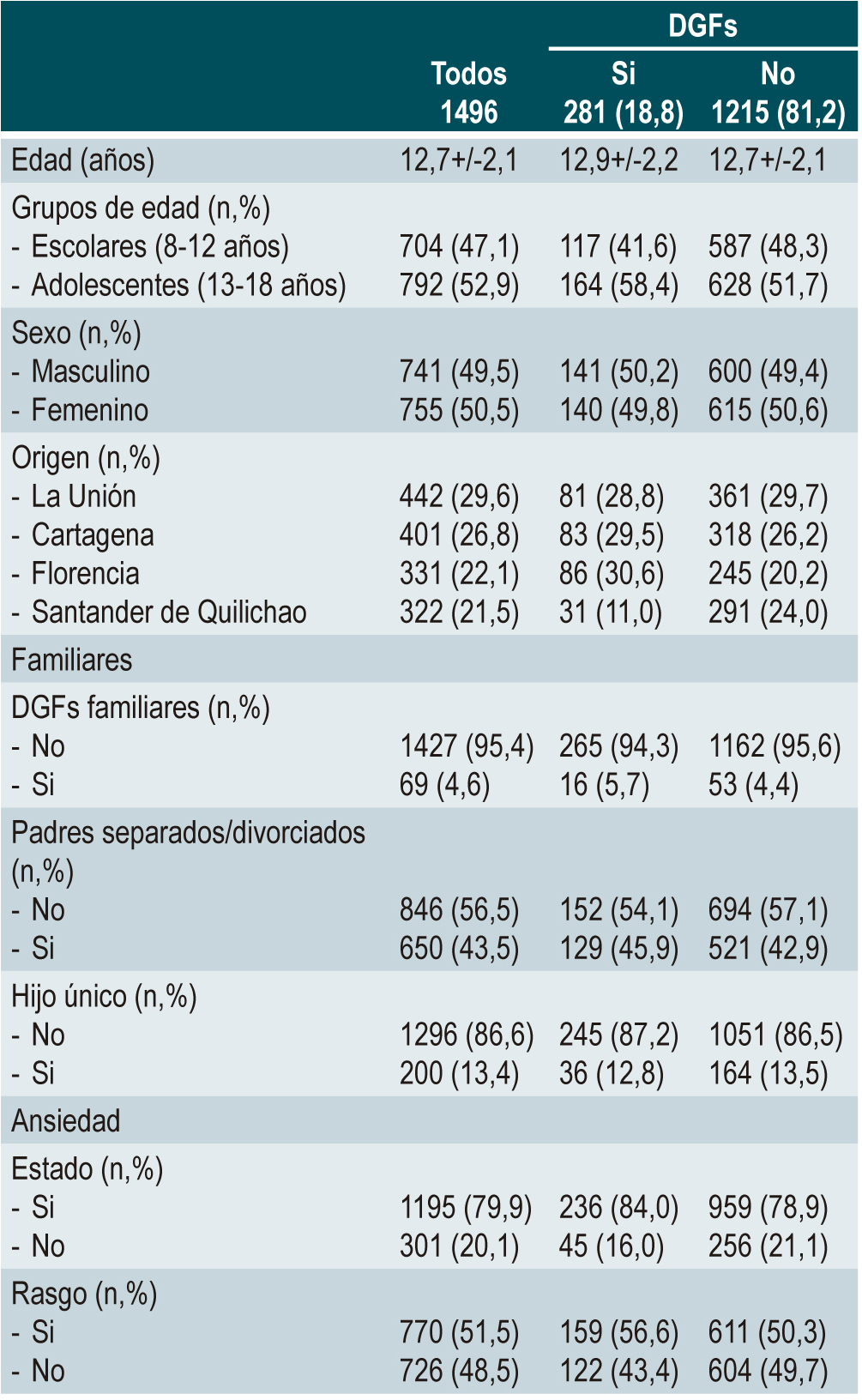Anxiety status and trait in Colombian schoolchildren and adolescents with and without functional gastrointestinal disorders
DOI:
https://doi.org/10.22516/25007440.416Keywords:
Anxiety, diseases of the digestive system, childrenAbstract
Introduction: The pathophysiology of functional gastrointestinal disorders includes alteration of the gut-brain axis.
Objective: This study measures prevalence and of functional gastrointestinal disorders and discusses possible associations with anxiety in children with these conditions.
Methodology: This is a prevalence study of children between 8 and 18 years of age diagnosed with functional gastrointestinal disorders as defined by the Rome III Criteria and anxiety as defined by the State-Trait Anxiety Inventory for Children in several Colombian cities. Sociodemographic and family variables were included. Statistical analyses included measures of central tendency, univariate and multivariate analysis, and logistic regression, with p <0.05 established as significant.
Results: The study included 1,496 children of whom 50.5% were girls. The boys average age was 12.7 ± 2.1 years, 79.9% had suffered transitory anxiety, and 51.5% had tendencies to experience states of anxiety. State/anxiety predominated in male adolescents while trait/anxiety predominated in female adolescents with functional gastrointestinal disorders. Possible risk factors for state/anxiety were age and sex. Possible risk factors for trait/anxiety were age, sex, and functional gastrointestinal disorders.
Conclusions: About half of the children tended to states of anxiety. Female adolescents predominated with risk factors of age, sex, and some functional gastrointestinal disorders.
Downloads
References
Hyams JS, Lorenzo CD, Saps M, Shulman RJ, Staiano A, van Tilgurg M. Childhood Functional Gastrointestinal Disorders: Child/Adolescent. Gastroenterology. 2016;150(5):1456-68.
https://doi.org/10.1053/j.gastro.2016.02.015
Rasquin A, Di Lorenzo C, Forbes D, Guiraldes E, Hyams JS, Staiano A, Walker LS. Childhood functional gastrointestinal disorders: Child/adolescent. Gastroenterology. 2006;130(6):1527-37.
https://doi.org/10.1053/j.gastro.2005.08.063
Boronat AC, Ferreira-Maia AP, Matijasevich A, Wang Y-P. Epidemiology of functional gastrointestinal disorders in children and adolescents: A systematic review. World J Gastroenterol. 2017;23(21):3915-27.
https://doi.org/10.3748/wjg.v23.i21.3915
Velasco-Benítez CA, Saps M, Chanís R, Játiva E, Zablah R, Mejía M, Rodríguez L, Leyva A, Moreno J, Ramírez CR, Sánchez MP, Aragón LE, Nichols-Vinuenza D. La epidemiología de los desórdenes gastrointestinales funcionales en escolares y adolescentes latinoamericanos. Acta Gastroenterol Latinoam. 2017;47(2):148-58.
Spielberg CD. State-Trait Anxiety Inventory for Children Professional Manual. Redwood City, CA: Mind Garden, Inc.; 1973.
Dufton LM, Dunn MJ, Compas BE. Anxiety and Somatic Complaints in Children with Recurrent Abdominal Pain and Anxiety Disorders. J Pediatr Psychol 2009;34(2):176-86.
https://doi.org/10.1093/jpepsy/jsn064
Campo JV, Bridge J, Ehmann M, Altman S, Lucas A, Birmaher B, Di Lorenzo C, Iyengar S, Brent DA. Recurrent abdominal pain, anxiety, and depression in primary care. Pediatrics. 2004;113(4):817-24.
https://doi.org/10.1542/peds.113.4.817
Garber J, Zeman J, Walker L. Recurrent abdominal pain in children: psychiatric diagnoses and parental psychopathology. 1990;29(4):648-56.
https://doi.org/10.1097/00004583-199007000-00021
Liakopoulou-Kairis M, Alifieraki T, Protagora D, Korpa T, Kondyli K, Dimosthenous E, Christopoulos G, Kovanis T. Recurrent abdominal pain and headache: psychopathology, life events and family functioning. Eur Child Adolesc Psychiatry. 2002;11(3):115-22.
https://doi.org/10.1007/s00787-002-0276-0
Walker LS, Lipani TA, Greene JW, Caines K, Stutts J, Polk DB, Caplan A, Rasquin-Weber A.. Recurrent Abdominal Pain: Symptom Subtypes Based on the Rome II Criteria for Pediatric Functional Gastrointestinal Disorders. J Pediatr Gastroenterol Nutr. 2004;38(2):187-91.
Caplan A, Walker L, Rasquin A. Development and preliminary validation of the questionnaire on pediatric gastrointestinal symptoms to assess functional gastrointestinal disorders in children and adolescents. J Pediatr Gastroenterol Nutr. 2005;41(3):296-304.
Caplan A, Walker L, Rasquin A. Validation of the Pediatric Rome II Criteria for Functional Gastrointestinal Disorders Using the Questionnaire on Pediatric Gastrointestinal Symptoms. J Pediatr Gastroenterol Nutr. 2005;41(3):305-16.
Saps M, Nichols-Vinueza DX, Mintjens S, Pusatcioglu CK, Velasco-Benítez CA. Construct validity of the pediatric Rome III criteria. J Pediatr Gastroenterol Nutr. 2014;59(5):577-81.
https://doi.org/10.1097/MPG.0000000000000482
Spielberger CD. Manual for the state-trait inventory for children. Palo Alto, CA: Consulting Psychologists; 1973.
Walker LS, Beck JE, Garber J, Lambert W. Children’s Somatization Inventory: Psychometric properties of the revised form (CSI-24). J Pediatr Psychol. 2009;34(4):430-40.
https://doi.org/10.1093/jpepsy/jsn093
Saps M, Moreno-Gómez JE, Ramírez-Hernández CR, Rosen JM, Velasco-Benítez CA. A nationwide study on the prevalence of functional gastrointestinal disorders in school-children. Bol Med Hosp Infant Mex. 2017;74(6):407-12.
https://doi.org/10.1016/j.bmhimx.2017.05.005
Cunningham NR, Cohen MB, Farrell MK, Mezoff AG, Lynch-Jordan A, Kashikar-Zuck S. Concordant parent-child reports of anxiety predict impairment in youth with functional abdominal pain. J Pediatr Gastroenterol Nutr. 2013;60(3):312-7.
https://doi.org/10.1097/MPG.0000000000000625
Rutten JMTM, Benninga MA, Vlieger AM. IBS and FAPS in children: A comparison of psychological and clinical characteristics. J Pediatr Gastroenterol Nutr. 2014;59(4):493-9.
https://doi.org/10.1097/MPG.0000000000000452
Gulewitsch MD, Weimer K, Enck P, Schwille-Kiuntke J, Hautzinger M, Schlarb AA. Stress reactivity in childhood functional abdominal pain or irritable bowel syndrome. Eur J Pain. 2017;21(1):166-77.
https://doi.org/10.1002/ejp.914
Waters AM, Schilpzand E, Bell C, Walker LS, Baber K. Functional gastrointestinal symptoms in children with anxiety disorders. J Abnorm Child Psychol. 2013;41(1):151-63.
https://doi.org/10.1007/s10802-012-9657-0
Pollard KL, Campbell C, Squires M, Palsson O, van Tilburg MAL. Seasonal Association of Pediatric Functional Abdominal Pain Disorders and Anxiety. J Pediatr Gastroenterol Nutr. 2018;67(1):18-22.
https://doi.org/10.1097/MPG.0000000000001886
Shelby GD, Shirkey KC, Sherman AL, Beck JE, Haman K, Shears AR, Horst SN, Smith CA, Garber J, Walker LS. Functional abdominal pain in childhood and long-term vulnerability to anxiety disorders. Pediatrics. 2013;132(3):475-82.
https://doi.org/10.1542/peds.2012-2191
Cunningham NR, Jagpal A, Peugh J, Farrell MK, Cohen MB, Mezoff AG, Lynch-Jordan A, Kashikar-Zuck S. Risk categorization predicts disability in pain-associated functional gastrointestinal disorders after 6 months. J Pediatr Gastroenterol Nutr. 2017;64(5):685-90.

Downloads
Published
How to Cite
Issue
Section
License
Aquellos autores/as que tengan publicaciones con esta revista, aceptan los términos siguientes:
Los autores/as ceden sus derechos de autor y garantizarán a la revista el derecho de primera publicación de su obra, el cuál estará simultáneamente sujeto a la Licencia de reconocimiento de Creative Commons que permite a terceros compartir la obra siempre que se indique su autor y su primera publicación en esta revista.
Los contenidos están protegidos bajo una licencia de Creative Commons Reconocimiento-NoComercial-SinObraDerivada 4.0 Internacional.


| Article metrics | |
|---|---|
| Abstract views | |
| Galley vies | |
| PDF Views | |
| HTML views | |
| Other views | |














